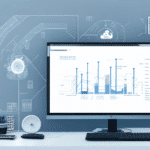Introduction to UDS in Infor CloudSuite Industrial (SyteLine)
In today's dynamic business landscape, leveraging advanced technologies is crucial for organizations aiming to enhance efficiency and drive growth. Infor CloudSuite Industrial (SyteLine) stands out as a leading enterprise resource planning (ERP) solution, empowering businesses to streamline operations, optimize processes, and boost profitability. A key feature of CloudSuite Industrial is the User Defined Server (UDS), a customizable tool that allows businesses to tailor the ERP system to their unique needs. This guide provides an in-depth look at how to connect, optimize, and manage UDS within Infor CloudSuite Industrial (SyteLine).
Benefits of Using UDS in Infor CloudSuite Industrial (SyteLine)
UDS offers numerous advantages for businesses utilizing Infor CloudSuite Industrial:
- Enhanced Visibility: Custom fields and tables allow for better categorization and tracking of business data, facilitating comprehensive reporting and analysis.
- Simplified Operations: Automating data entry and workflows reduces manual effort and minimizes the risk of errors.
- Streamlined Reporting: Tailored reports provide deeper insights into business performance, aiding in data-driven decision-making.
- Improved Productivity: Customizations align the ERP system with specific business processes, enhancing overall efficiency.
- Scalability: UDS allows the system to grow with the business, accommodating expanding data requirements without extensive redevelopment.
These benefits collectively contribute to a more agile and responsive business environment, enabling organizations to adapt swiftly to market changes.
Setting Up UDS in Infor CloudSuite Industrial (SyteLine)
Implementing UDS involves a series of strategic steps to ensure seamless integration and functionality:
- Assess Business Requirements: Identify the specific data fields and tables that align with your business needs.
- Design Custom Structures: Utilize UDS's graphical interface to create custom tables and fields through a user-friendly drag-and-drop mechanism.
- Validate Customizations: Ensure that the newly created fields and tables meet your business objectives and maintain data consistency.
- Deploy to SyteLine Applications: Integrate the custom structures into SyteLine applications, making them accessible to end-users.
- Training and Support: Provide adequate training to users and establish support channels to address any issues that may arise post-deployment.
Following these steps ensures that UDS is effectively integrated into your ERP system, providing maximum value to your organization.
Optimizing UDS Performance
To ensure UDS operates efficiently within Infor CloudSuite Industrial, it is essential to adhere to best practices:
- Create Efficient Data Models: Design data structures that minimize complexity and avoid unnecessary interdependencies.
- Utilize Indexing and Caching: Implement indexing strategies to speed up data retrieval and use caching to enhance performance.
- Batch Processing: Handle data updates in batches to reduce system load and improve processing times.
- Regular Maintenance: Periodically review and optimize custom fields and tables to maintain optimal performance.
Adopting these practices helps in maintaining a responsive and reliable UDS setup, ensuring that the ERP system continues to support business operations effectively.
Managing UDS Effectively
Effective management of UDS involves continuous monitoring and proactive strategies to maintain data integrity and system performance:
- Regular Validation: Consistently verify that custom fields and tables are accurate and aligned with business needs.
- Audit UDS Usage: Monitor how UDS is being utilized across the organization to identify and address any inefficiencies.
- Secure Data Access: Implement stringent access controls to protect sensitive data and ensure that only authorized personnel can make changes.
- Performance Monitoring: Use monitoring tools to track UDS performance and address any issues promptly.
By maintaining rigorous management practices, businesses can ensure that UDS remains a valuable asset within their ERP ecosystem.
Troubleshooting and Ensuring Data Integrity with UDS
Despite its robustness, UDS may encounter challenges such as data inconsistencies or performance bottlenecks. Here are some strategies to address common issues:
- Validate Customizations: Regularly check custom tables and fields for accuracy and compatibility with SyteLine modules.
- Optimize Queries: Refine database queries to enhance performance and reduce load times.
- Update Systems: Keep SyteLine databases and patches up to date to prevent compatibility issues.
- Monitor Logs: Analyze system logs to identify and rectify error messages promptly.
- Implement Data Validation Rules: Enforce strict data validation to maintain consistency and accuracy across all custom fields and tables.
Ensuring data integrity is paramount for reliable business operations, and these troubleshooting tips help maintain a robust UDS environment.
The Future of UDS in Infor CloudSuite Industrial (SyteLine)
As Infor CloudSuite Industrial continues to evolve, so does the functionality of UDS. Future developments are expected to focus on:
- Enhanced Performance: Improvements in speed and efficiency to handle larger data volumes.
- Advanced Security Features: Increased security measures to protect sensitive business data.
- Seamless Integration: Better integration capabilities with emerging technologies and other enterprise applications.
- User-Friendly Enhancements: More intuitive interfaces and tools to simplify customization and management processes.
These advancements will further empower businesses to customize their ERP systems, ensuring that Infor CloudSuite Industrial remains a cutting-edge solution for diverse industry needs.
Conclusion: The Essential Role of UDS in Infor CloudSuite Industrial (SyteLine)
The User Defined Server (UDS) is an indispensable tool for businesses leveraging Infor CloudSuite Industrial (SyteLine). By enabling the creation of customized tables and fields, UDS allows organizations to tailor their ERP systems to specific business requirements, enhancing operational efficiency and decision-making capabilities. To fully realize the benefits of UDS, it's essential to implement best practices in setup, optimization, and management. By doing so, businesses can ensure that their UDS setup not only meets current needs but is also scalable for future growth.
For more information on optimizing your ERP systems, consider exploring resources from reputable sources such as Infor’s official resources or industry-leading publications like Gartner.






















